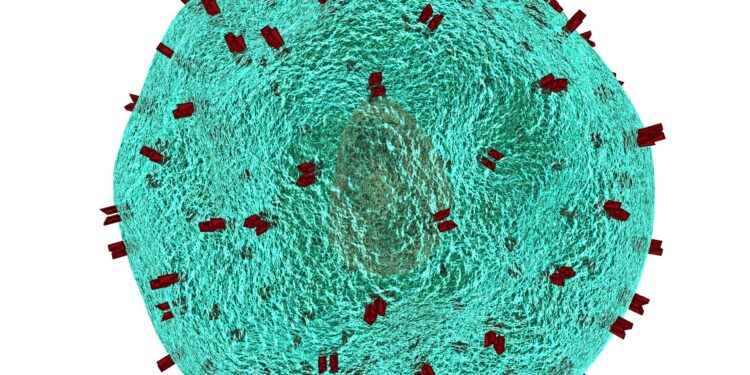Credit: Pixabay/CC0 Public domain
Scientists at Ludwig Cancer Research have designed new types of chimeric antigen receptor (CAR) T cells – a type of cancer immunotherapy – that can be activated to varying degrees of intensity and then deactivated on demand with drugs existing. The design and preclinical evaluation of CAR-T cells, led by Melita Irving and Greta Maria Paola Giordano Attianese of the Lausanne branch of the Ludwig Institute for Cancer Research, are detailed in Proceedings of the National Academy of Sciences.
“CAR-T cells are already used today to treat a number of blood cancers, but solid tumors continue to pose significant challenges for this mode of therapy in terms of safety and effectiveness,” said Irving. . “We potentially solved both of these problems by designing, directly into the CAR design, on/off switches activated by drugs approved by regulatory agencies and already in clinical use. This should accelerate the progress of these remote systems. CAR-T cells monitored in clinical trials.
CAR-T cells express synthetic receptors that detect specific molecular markers, or antigens, on cancer cells using an antibody fragment as an external sensor. When the CAR binds its antigen to a cancer cell, its signaling modules are activated and trigger the innate cytotoxic weaponry of T lymphocytes to destroy the tumor cells.
The problem is that many solid tumor antigens are also found on healthy cells, increasing the risk of so-called “off-tumor, on-target” effects. These can cause destructive immune responses that are difficult to control and potentially fatal for the patient. Conversely – and perhaps more commonly – immunosuppressive conditions of the solid tumor microenvironment can push antitumor T cells, including those equipped with CARs, into a state of dysfunction called “exhaustion.”
“Having the ability to remotely activate CAR-T cells to varying degrees using different doses of an activator drug, and then deactivate them on demand, as needed, would improve the safety of this therapy,” Giordano said Attianese. “In addition, remote control of CAR-T cell activity could also be used to mitigate T cell exhaustion, thereby improving the durability of patient responses to therapy.”
The latter possibility arises from studies led by Ludwig Stanford’s Crystal Mackall, showing that giving CAR-T cells rest periods between episodes of active tumor targeting rewrites their gene expression programs, reverses exhaustion, and largely improves their functional effectiveness.
Classic CARs are single-chain receptors that directly link tumor antigen binding to internal signaling components derived from the functional modules, or “domains,” of a few key T cell proteins. The CAR antigen sensor, which protrudes from the modified T cell like a rod, is usually derived from the antigen-binding fragment of an antibody molecule, which can be developed to detect virtually any target on tumor cells with exquisite specificity.
The internal signaling components usually come from a protein called CD3-ζ, which is absolutely necessary to activate the T cell upon antigen binding, and another protein borrowed from a “co-stimulatory” protein ( such as 4-1BB or CD28) which stimulates function. and persistence of T cells after activation.
To enable control of CAR activity, Irving, Attianese and colleagues separated the antigen detection fragment (the antibody fragment) and the activation domain (CD3-ζ) onto two distinct chains, the receptor chain” and the “signaling chain”. Leveraging the expertise of Bruno Correia of the École Polytechnique Fédérale de Lausanne (EPFL), they also included an additional module capable of dimerizing both chains when applying an anticancer drug called venetoclax.
When it binds to these external modules, the venetoclax molecule acts as a bridge, bringing the two chains together to create an active CAR complex – and the strength of the subsequent CAR-T cell response depends on the amount of drug used . The researchers named this CAR construct the “inducible-ON” CAR (iON).
However, to be truly safe, CAR-T cells must also be turned off quickly if they pose a danger to patients. To this end, the researchers added an additional drug component to the CD3-ζ signaling chain that responds to another approved cancer drug called lenalidomide. This binding, however, marks the receptor for degradation by the cell’s waste disposal machinery. Researchers show that iON/OFF CAR all-in-one T cells (iONØ-CAR) can be activated by venetoclax and rapidly deactivated – within 4 to 6 hours – by lenalidomide.
The researchers next plan to better characterize the performance of their iON and iONØ-CAR against different tumor models. They will also test whether remote control of cells effectively prevents the toxicity of overactive CAR-T responses and whether periodic rest periods can improve long-term tumor control.
More information:
Melita Irving et al, Double on/off switch chimeric antigen receptor controlled by two clinically approved drugs, Proceedings of the National Academy of Sciences (2024). DOI: 10.1073/pnas.2405085121
Provided by Ludwig Cancer Research
Quote: New CAR-T cells offer on-demand control for cancer treatment (October 22, 2024) retrieved October 22, 2024 from
This document is subject to copyright. Except for fair use for private study or research purposes, no part may be reproduced without written permission. The content is provided for informational purposes only.



